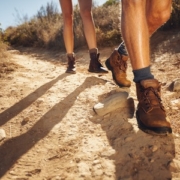5 Foot Conditions Alcohol Contributes To
While enjoying a drink or two might be a part of social gatherings, excessive alcohol consumption can have far-reaching consequences for the health of your feet and ankles. It’s National Alcohol Awareness Month, which means it’s time to realize that alcohol can interfere with various bodily functions and lead to a range of foot and ankle problems. Today, we at Carrollton Foot Center will unpack 5 of the most common, from causes to symptoms and further complications.
Alcohol’s Impact on Your Feet and Ankles
- Peripheral Neuropathy
Peripheral neuropathy can be significantly affected by excessive alcohol intake. Alcohol is a neurotoxin, meaning it can damage these nerves and impair their ability to send important signals.
This damage often manifests in the feet and ankles and gives you numbness, tingling, burning pain, and weakness. Reduced sensation in the feet can make it difficult to detect injuries, which increases the risk of unnoticed cuts, sores, and developing infections.
- Diabetes
That brings us to alcohol’s effects on diabetes. Not only does it disrupt blood sugar regulation and cause hyperglycemia and hypoglycemia, but alcohol is also a diuretic that causes dehydration. If you are a diabetic already prone to infection, excessive use can further increase your risk of dry, cracked skin.
Alcohol also weakens the immune system, making such infections harder to fight off, and contributes to weight gain that puts extra stress on your diabetes (which continues the vicious cycle).
- Gout
Gout (a form of inflammatory arthritis) is another condition heavily influenced by alcohol consumption. Essentially, alcohol interferes with the kidneys’ ability to effectively eliminate uric acid from the body. This buildup of crystals drives intense pain in the big toe joint (along with swelling, redness, and warmth).
Gout isn’t exclusive to the big toe, though. It can also affect other joints in the foot and ankle, causing unique discomfort and mobility issues.
- Swollen Ankles
Alcohol can impair the function of the liver and kidneys, both of which play crucial roles in regulating fluid balance in the body. When these organs are compromised, it can lead to fluid accumulation in the feet and ankles. This swelling can cause the feet and ankles to feel heavy, tight, and uncomfortable, potentially hindering movement.
- Injury
Beyond these specific conditions, studies show that excessive alcohol consumption significantly increases the risk of foot and ankle injuries. The impaired coordination, balance, and judgment can result in a variety of injuries, including sprains, fractures, and dislocations.
Consult with Board-certified podiatrist Dr. Naghmeh Lilly Khavari, a knowledgeable professional who is dedicated to her patients in Denton, Dallas, and Collins Counties. Dr. Khavari treats a wide range of conditions, from ingrown toenails to foot and ankle injuries. Call Carrollton Foot Center’s office (located in Carrollton, Texas) at (469)-998-3668 to schedule your first appointment today!




